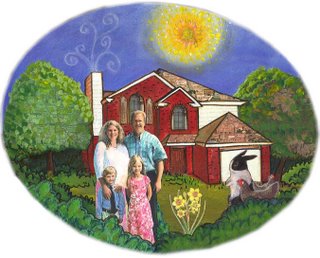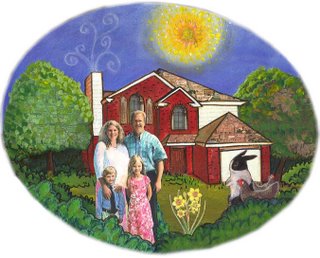Not at all what I intended
I'm still here. . .not much to report. I'm listening to a PBS thing about the freedom riders of the 1960's and how school children who were marching got carried to jail. I don't know as much as I should about Civil Rights. . .some of what I know is tainted by where I was reared.
I'm from the very deep south. In fact, my kids (at school) will hear a story this week about how I saw the evidences of segregation in the town in which I grew up. . .as in when the old one-screened movie theater was being renovated, a large sign was removed from the building. It had been put up there to cover the large painted letters that said, "Colored" and pointed to the entrance that blacks had to use to get to the balcony. And in the back of the old feed and seed store, there were two water fountains. . .side by side. No signs there, but we knew what they had been used for.
I had to explain segregation to Victoria a couple of years ago. She did a report on Rosa Parks in 1st grade. Her teacher, Mrs. Johnson, is an excellent teacher. . .and is black. . .and is from Selma, Alabama. Victoria came home talking about "Dr. King" one day. I'd never realized until that day that I don't ever call him "Dr. King"--I call him "Martin Luther King, Jr." It's a small difference in vernacular, but a noticable one once I realized it. Anyway--Victoria did a report on Rosa Parks.
The funny part was that she did a play in which she, a blond-haired, blue-eyed, white girl played Rosa. And for her bus driver she chose to ask Shane--a dark-haired, brown-eyed African-American boy. He got to tell her she had to give up her seat or he would throw her off the bus or have her arrested. Mrs. Johnson and I both had a good laugh over that one--and a deep sigh over how times have changed.
The sad part was that I had to explain segregation to my 6 year old. The only way I knew to tell her how bad it was, was to say, "A long time ago, Mrs. Johnson couldn't be your teacher, and Shane couldn't be your friend. It would be against the law for Mrs. Johnson to teach you. . .or for me to teach some of the kids I teach."
The good part was that after the explanation Victoria said, "I think that was a very bad idea."
We will read a story this week about Matthew Henson. He was with Robert Peary when he discovered the North Pole. I know there is some controversy about actually who discovered the North Pole and when it was done, but Matthew Henson was there right at the beginning. He was born one year after the Civil War, and was the only member of the party that discovered the North Pole not to receive a commendation. . .because he was black. He wasn't recognized for his contribution until 50 years after the fact. I have to tell some of my kids what it means in the story when Peary refers to Henson as, "My faithful colored boy." I don't have to explain it to the black kids--they know what colored is--but I do have to explain it to everyone else. And that's a good thing--we've come a long way--I see the tensions still, but I also see the changes.
So this was not at all what I intended. . .it just sort of spilled out. . .and to quote Forrest Gump, "And that's all I have to say about that."


5 Comments:
I have always had an interest in Civil Rights. I have made Nicholas very aware, at an early age, of its history. This summer he and I read the book "Black Like Me". Awareness is important. Also awareness how things have changed and how things can still be improved. I would have loved to see the play!
That is funny that you write about this because it is something that Jerry and I have been discussing in the last few weeks here. We know our parents, both sets of them were very prejustice, especially our fathers. And we grew up with this, learning that we should hate and fear blacks. We didn't really live by this rule of hate but also weren't really around black people that much. As life moved on we were around blacks more and more in our everyday life and like them just as much as we do anyone else. In one way we see no difference but as we see more and more blacks and whites dating we can't help but think we don't want our kids dating black people. I know some of this is from our upbringing and thinking our parents won't except us or our kids if they were to marry a black but to be totally honest some of it is our own prejustice still there. We have been going back and forth between is this wrong or right? How do black people feel about whites marrying their kids? I don't know the answers to these questions but am still trying to figure them out.
Sandy- I have not read that book but will look for it.
Mouse- I grew up the same way you did--in the small town where I lived there was still a "black side of town". . .and to some extent their still is. Now I live in Houston, and even if bi-racial marriage is not the norm here, it is certainly more prevalent simply because it's an urban area and there are lots of people.
From what I've seen and experienced, I think there is still a lot of uneasiness when a child of any color or race marries a child of another color or race, but as the years roll on, I think the tensions will ease even more.
I went to private school in Mississippi, all through my elementary years. The school was all white-- in the eighties. My cousins graduated from there over the last few years. And it's STILL all white. On purpose. I don't see how it's ever going to change, until somebody comes in with some very, very overdue litigation and MAKES them change. I wouldn't be surprised if the school had to close before they'd do that. I never heard of Dr. King until we moved to California.
P.S. (To Mouse) Once, when I was in college, I became close friends with a talented classical music major, who happened to be black. I was considering a dating relationship with him, but ended up taking a semester abroad instead. I later learned that, had I dated him, my grandparents would have literally disowned me. My gut reaction to that was, if that was all it took to lose their favor, I'd have no qualms about disowning them right back. It ended up not being an issue, but for a lot of people, on both sides, it's a huge issue.
Why? Why are there still people so backward (of all races) who let skin color declare divisions? What a boring world we'd live in if everyone was the same.
Love that movie, Forrest Gump.
Post a Comment
<< Home